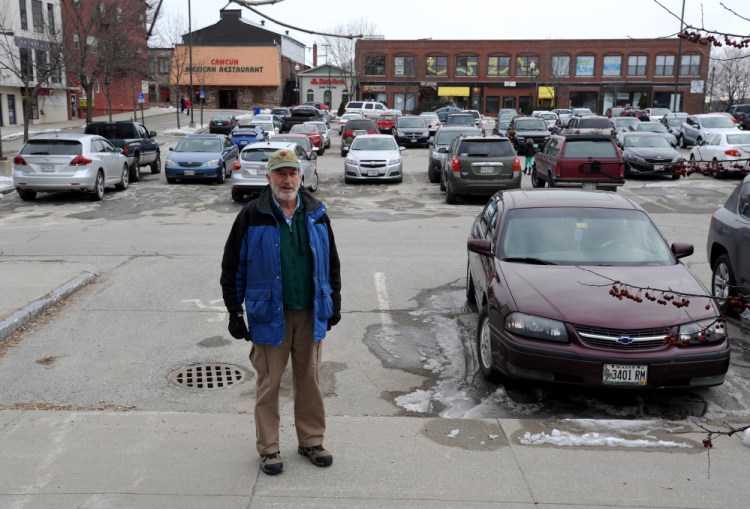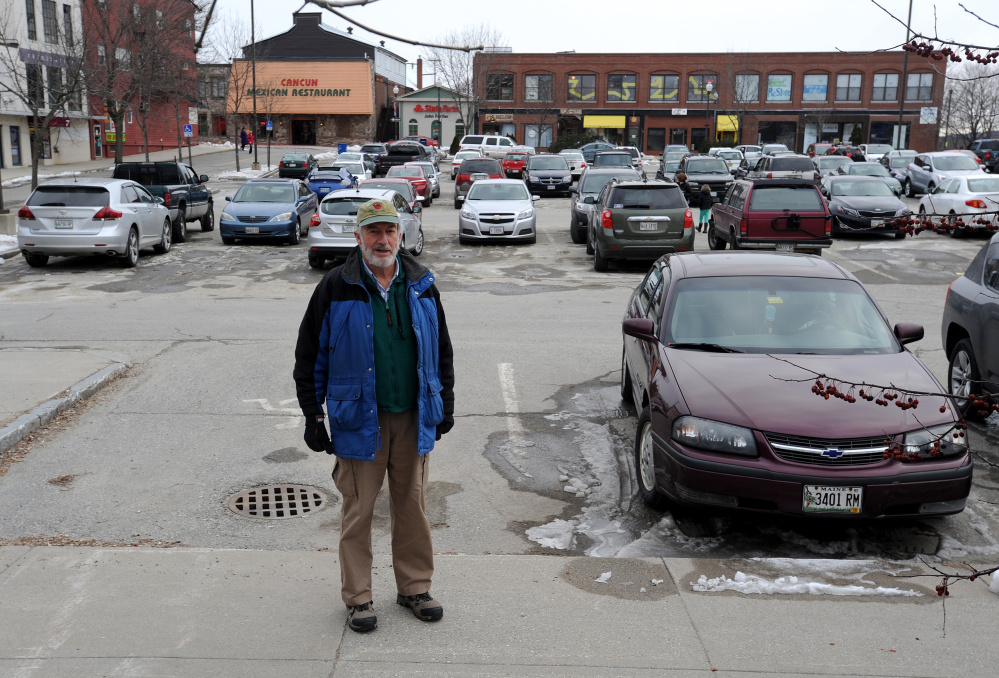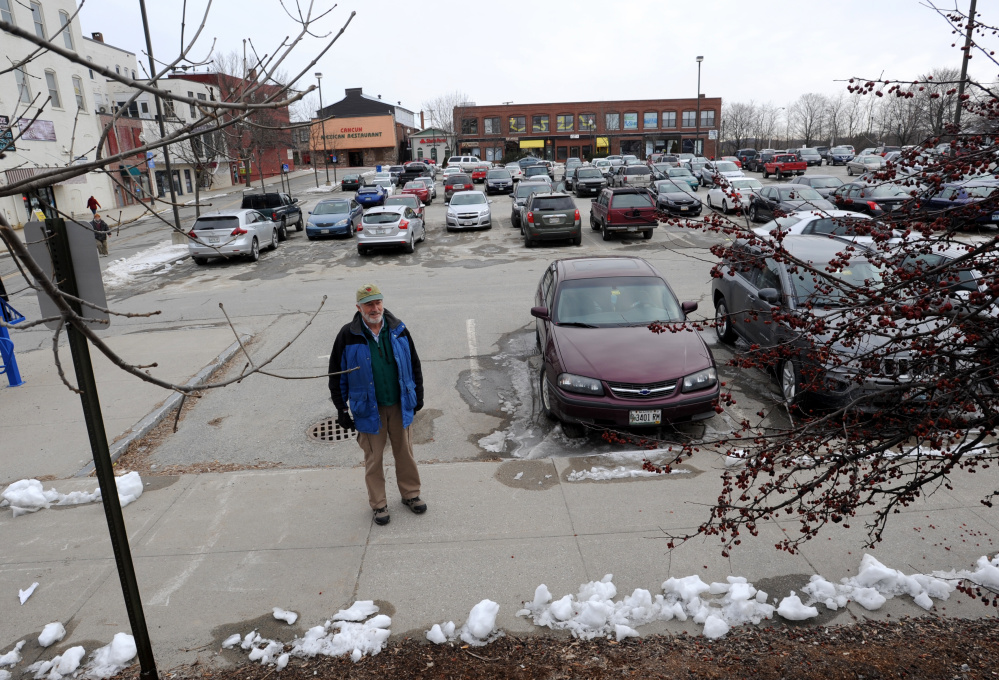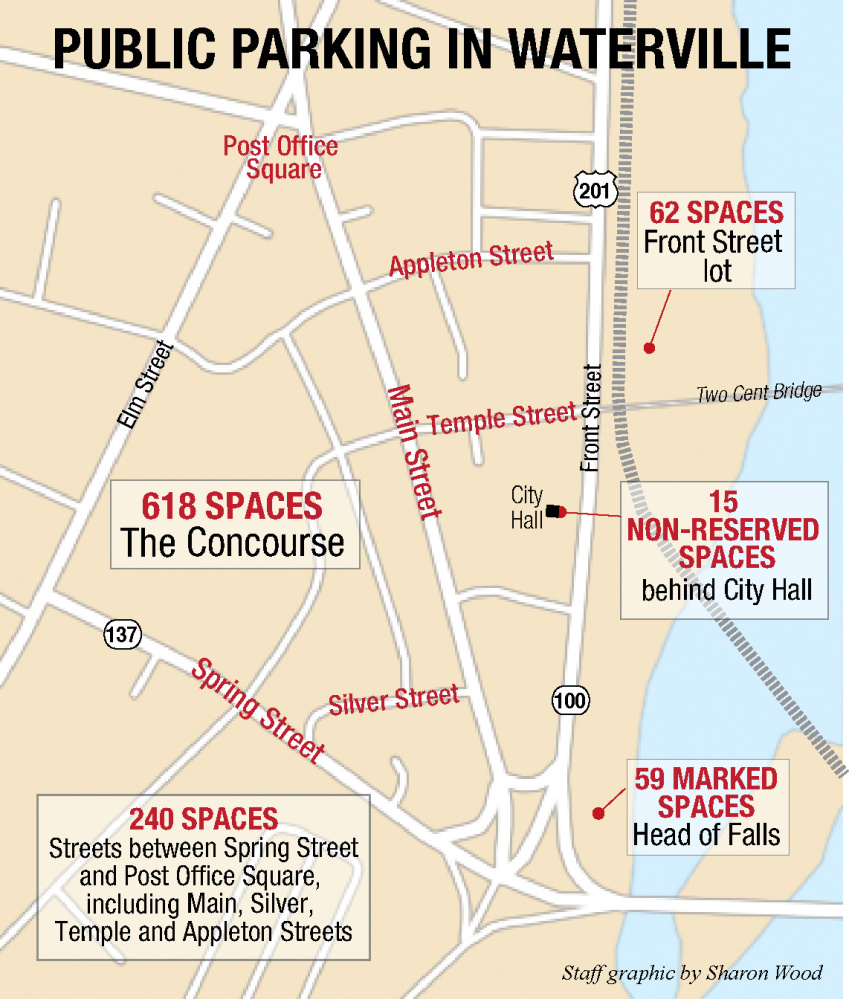WATERVILLE — Bill Basford says the city’s only parking problem is that there’s too much free parking.
Basford, 70, a retired engineer, went around the city on several recent Sundays, counting spaces in parking lots.
The Concourse has 618 spaces. Head of Falls has 59 marked spaces and the city-owned lot on Front Street near Spring Street has 62 spaces.
There are 15 nonreserved spots behind City Hall off Front Street and 240 on streets between Spring Street and Post Office Square, including Main, Silver, Temple and Appleton streets.
“That gets you to just about 1,000 spaces,” he said.
He says there are other parking spaces around town — a few behind Camden National Bank off Front Street, around 20 behind the downtown block of buildings that includes Jorgensen’s Cafe, and around 39 from Post Office Square north to the railroad tracks at the entrance to Elm Street that have not been marked out since the street was paved. There’s also a city-owned lot on Water Street with 93 spaces, and dozens of other spaces off Appleton Street, behind downtown buildings, in church lots and other places, he said.
His study comes at a time when the city is looking at major developments downtown, including Colby College’s plan to build a dormitory at the corner of Main and Appleton streets in the next couple of years. The college also bought five deteriorating buildings downtown with plans to partner with investors to renovate them and put retail/commercial entities on first floors and offices and other uses on upper floors.
Basford, of Fairfield, drives as little as possible. He rides his bicycle 4 miles into downtown Waterville nearly every day.
Basford plans to touch on parking issues as part of a talk he’ll give at 6:30 p.m. Thursday, March 17, at Colby. The talk is sponsored by Sustain Mid-Maine, of which Basford is a member.
Meanwhile, the group Waterville Main Street is asking business owners to abide by city parking rules as more activity comes downtown and fewer spaces are available.
Since more people will live and work downtown, discussion about parking and traffic among city officials, business leaders and others has been ongoing, with some saying the city does not have enough parking spaces now and a parking garage might be needed.
The city, Colby and the state Department of Transportation pitched in a total of $102,000 for the city to hire Gorrill Palmer, an engineering firm from Gray, to do a study assessing current and future traffic and parking issues in light of the downtown revitalization effort. The goal is to have the study completed by July 1, according to Randy Dunton, senior engineer for Gorrill Palmer. The study will look at related issues, including whether two-way traffic should be returned to Main Street downtown.
PRIME PARKING
Waterville Main Street, a nonprofit group that promotes the city’s downtown, recently sent a message to downtown business owners saying they may have noticed fewer parking spots available lately because “of increasing occupancy rates in downtown’s first-floor retail and second-floor office spaces.”
June L’Heureux, acting director of the group, wrote in an email that businesses should reinforce best practices for parking.
There are some two-hour limit spaces, unmarked spaces with no limits that are best used by customers and spaces with a star that are designated long-term parking mainly for those who work downtown, L’Heureux wrote.
“We urge you to consider the economic impact of reserving prime parking spots for your patrons and your neighbor’s patrons, and the positive environment for commerce that we can create through our decision to park in designated long term parking spots,” L’Heureux wrote.
Basford, who spoke to the City Council recently about his parking ideas, disagrees with those who say there is not enough parking downtown.
“What they’re really saying is, ‘There’s not enough parking spaces within shouting distance of the door,'” he said. “Some people insist on parking as close as they can to wherever they’re going, and it doesn’t do them any good. They really should be getting more exercise.”
People who must park close for physical reasons have placards for the handicapped, he said.
“The big problem I see is, there are way too many all-day parking spaces,” Basford said. “If store owners are worried about the shoppers, the shoppers rarely need more than two hours.”
People who work downtown do not need to park close to shops, he said.
He doesn’t think a parking garage is needed.
“I would suggest the city start selling monthly permits for about $40 for all-day parking on The Concourse and see how many people actually buy them, or do they park two or three blocks away and walk? If they’re not willing to pay two or three bucks a day for parking, they don’t really need it. That’s my theory.”
Basford contends the revenue generated in parking fees could be used for services such as snow removal and street lighting for parking lots.
Now there are 176 parking spaces on The Concourse designated with stars, which means people may park there all day, he said. The millions of dollars that could be spent on a parking garage, he said, could be better spent building efficiency apartments.
‘WE’RE MOVING FORWARD’
Not everyone agrees with Basford’s outside-the-box thinking.
Mayor Nick Isgro, who listened to Basford’s talk at a recent City Council meeting, said he agrees that downtown has no parking problem now, but with hundreds more people living and working there in the next several years, things will change. In addition to building a dormitory downtown that would house at least 150 people, Colby also wants to see a boutique hotel and more retail stores.
The technology company Collaborative Consulting also plans to have about 200 people working in the city in the next three to five years.
“I give him credit,” Isgro said of Basford. “I think he did a lot of work and clearly put together an interesting analysis. I would not say I completely agree. I definitely think we’re going to need more parking. I don’t know that we’re going to need a parking garage — that may be five or 10 years out, if everything goes as planned.”
The city is looking at all aspects of traffic and parking as part of the study, as city officials want to be able to report back about different options to consider, according to Isgro.
“I think we’re in a good place and we’re moving forward,” he said.
City Councilor Nathaniel White, D-Ward 2, says he does not think the city has a parking problem.
“First of all, if the only thing we have to worry about is parking, this is a good thing; because if there’s not enough parking, then we have a really good Main Street,” White said. “Some people will disagree with me, but I go to the bank every day during rush hour and sometimes in the evening, to the ATM, and I’ve never had a problem with parking. I usually get a spot in front, or a few feet down. At the Tuesday council meetings, most of the time I’m parking in front of 93 Main St.”
Council meetings are held in The Center at that address.
White said he is a big advocate for parking farther away and walking to a destination.
“In the past year I’ve lost 80 pounds,” he said. “I haven’t done any special diet. It’s basically increasing my physical activity, and I think people need to do that more, and if that entails parking at one end of The Concourse and walking to the Opera House or library — just physical activity alone is going to give people a healthier lifestyle.”
WHAT TO DO
If having more people living and working downtown presents a parking problem, the city will address it, according to White.
“Only time will tell,” he said. “Some people are upset about the traffic study, but we need to do this to look at what will happen with those businesses possibly coming in. We have to wait and see what the traffic study says, and yes, if there’s a need for a new parking arrangement, I’m sure the city will figure it out.”
The new dormitory to be built at the northeast end of The Concourse will displace 93 parking spaces. White is not concerned about that and says he is confident any problems that may arise will be addressed.
“Everything will happen and come together,” he said. “I have full faith in that.”
Basford’s talk at Colby on March 17 is titled “Driving to the Poor House: How Maine Became one of the ‘Poor States.'” He said he will discuss how much money leaves the state because of excess spending on vehicles.
He also will suggest things the city can do, without spending a lot of money, to make it easier and less expensive to build new housing downtown.
“When you have 1,000 free parking spaces downtown, … it just encourages people to drive downtown and park right in the middle of the street,” he said.
“It would be better to have more housing and less parking. If people live right downtown, they don’t need so many cars. My recommendations are basic things that local governments can do to make it easier for people to live here without so many cars — more housing downtown and people don’t have to drive as much.”
City Manager Michael Roy was on vacation when Basford spoke at the council meeting, but he said Friday that the city is engaged in the comprehensive traffic and parking study and the city is committed to providing adequate parking over time — including the spaces to be lost with construction of the Colby dormitory.
“We recognize the loss of parking spaces from the development of that area of The Concourse; in fact, we’re already been in meetings planning how to replace some or all of those spaces,” he said.
This story has been corrected.
Amy Calder — 861-9247
Twitter: @AmyCalder17
Send questions/comments to the editors.






